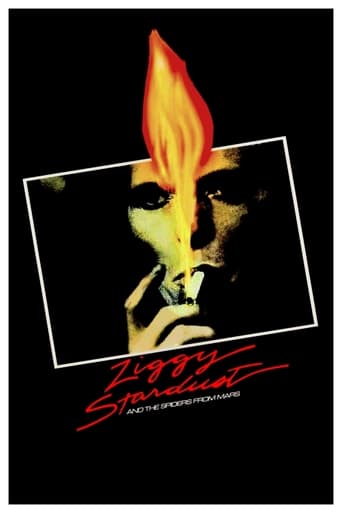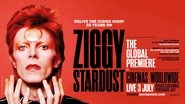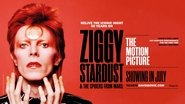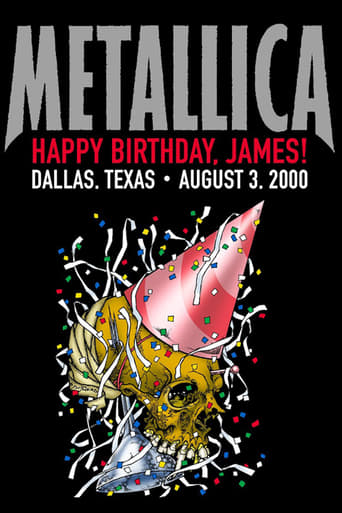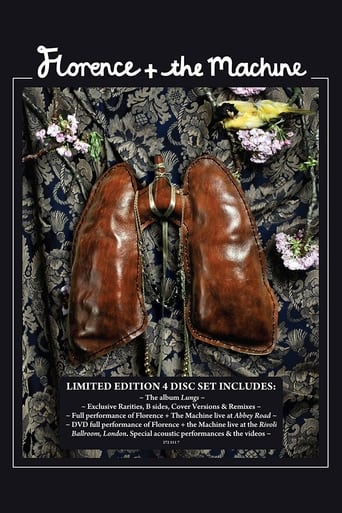MisterWhiplash
To look at Ziggy Stardust and the Spiders from Mars and be much too critical of it, and this is now four months since David Bowie left his corporeal form (has it been that long already?) is difficult. I know I can certainly nitpick certain things, mostly in the streak of the 'auteur'; given that this is DA Pennebaker, who also brought us basically the definitive Dylan doc from the era a decade before this, Don't Look Back, and the precursor to Woodstock in Monterey Pop, this isn't quite as superlative as those films as far as the Cinema Verite fly-on-the-wall approach. There's some behind the scenes stuff, but it's not terribly involving (aside from seeing Bowie's make-up put on to make him Ziggy) as the conversations seem muted and uninteresting (yes, even with Ringo backstage which seems a feat).BUT, and this is the big but here, I know deep down I don't care, at least as far as why I wanted to watch this again. And somehow, of all things, watching his life performance here of 'Space Oddity' finally made me cry. I don't know whether it would've brought me to tears (not for too long, just enough, and some of it was due to feeling a connection with the audience as a couple of people shown by Pennebaker's camera were also in tears), but it was in that moment it hit me: we won't get this again, not quite in this style, not quite in this style, not shot on such rough film and in such an atmosphere.Of course there are still provocateurs in rock/pop (Marilyn Manson on the heavier side, Lady Gaga on the more space-driven and sexual, if it can somehow get more sexual than Bowie), but Bowie was his own sound much as Tarantino was and is his own filmmaker: taking from various sources (rock, blues, glam from T-Rex, the avant-garde rock of Lou Reed, Iggy Pop to an extent) and making it his own giant and unmistakbale SOUND in full caps. And don't forget this is David Bowie as Ziggy friggin Stardust and the Spiders from Mars - including the practically incomparable guitarist Mick Ronson on guitar playing like he's ten years ahead of the fashion and heavy metal stars only still in his own class - and playing off of all the works he'd done up through the masterpiece Aladdin Sane.Here you get to see him perform many of his big hits (along with Oddity you get 'Changes' and 'Suffragette City' and his own rendition of 'All the Young Dudes' which he wrote), and Pennebaker and his crew are at times breathless to keep up and yet have enough cameras and sense to also get the crowd. The audience is a key part of this, even as at times it's hard to see all of them and the lights make it into its own stylized piece of filmmaking; they're often seen only briefly, and yet what we see is enough and, again, I think this helps to connect the audience watching the film further with the band. But for all the hits (and some covers, like 'White Light White Heat' and 'Let's Spend the Night Together'), the stand-outs here are the songs that people who only know Bowie from classic rock radio won't know as well.By the time that Bowie and the Spiders get to 'Time', which is more indebted to German lounge singing of the early 20th century (Threepenny Opera anyone?), the softer but incredibly incisive 'My Death', and a wild, possibly overlong but who the hell cares rendition of his most metal-ish song 'The Width of a Circle', he's on fire as a performer and totally in control of how he can command a stage and an audience. In other words it may not be the perfect rock documentary, hence why it's not the full top-star rating. But as far as performances by mega-stars in their prime, this is a keeper (and ironic that this was his "final" performance, of course just the beginning of the many many Bowies). And yet the tears I had briefly watching this and coming to grips after months of feeling numb to his loss were I think the fact that he'd still be iconic if all he left was this.
jc-osms
D A Pennebaker had already filmed icons like Dylan and Lennon before getting the gig to film David Bowie's "farewell" concert at London Hammersmith Odeon in July 1973. Bowie was huge in Britain at the time but had yet to break America which makes me tend to think the assignment came to him rather than the other way round.Actually as a great fan of glam rock back in the day (being 13 at the time of the movie's shooting date, how could I not be, 1972-73, being glam's heyday here), I do remember the fuss about this being Bowie's last show, giving the concert great curiosity, not to mention envy value at the time to fans in the sticks like me. To discover that this historic show was captured in full was a great and welcome surprise to me.That said, the film-maker's approach to the concert is pretty conservative actually as we get a little bit of pre-show scene-setting, with Bowie getting made-up in his dressing room, chatting to his wife Angie, while cutting in scenes of his adoring, often lookalike fans outside. Without too much delay, however, the show's on and Bowie and his band, the latter brilliantly led by Mick Ronson on lead guitar, tear into a great set, culminating in the famous, if misleading "This is our last show" quote and the bathetic euphoria which greets final song "Rock and Roll Suicide".In between, we get four costume changes, a goodly selection of numbers from his just-released "Aladdin Sane" album (but no "Jean Genie" sadly!), plenty, naturally from the "Ziggy Stardust" album but also tracks from some of his earlier albums. Unlike other rock-movies by the Rolling Stones and Led Zeppelin, Bowie and the band are on fine form, with confidence exuding from the singer's every phrase and move.Yes, some tracks go on too long, it was a shame that two of his best tunes ("All The Young Dudes" and "Oh! You Pretty Things) get rather thrown away in a medley, but against that there are great covers of Jacques Brel's "My Death" and the Velvets' "White Light White Heat", although I'm still undecided at what to make of the somewhat ridiculous mine-sequence during an almost never-ending version of "Wild Eyed Boy From Freecloud". Pennebaker's editing is adequate if, as I say, unimaginative, making the most of the no doubt limited camera numbers available to him, but thereafter just cutting from Bowie and Ronson (you barely see the rest of the band) to the ecstatic audience. Somehow Ringo Starr, director of Bowie friend and rival Marc Bolan's "Born To Boogie" movie the previous year, appears in Bowie's dressing room between songs casting an envious eye no doubt on a missed opportunity behind the lens again.Anyway, I was rapt by this exciting glimpse of a top artist on top form, masterminding his destiny to a "T", delivering a great rock and roll show in the process.What of course differentiates this show to contemporary rock concerts is that Bowie treats the performance itself as musical theatre, quite literally, a performance artist if ever there was one.
S. M.
Don't come expecting plot: Ziggy Stardust and the Spiders from Mars is just a concert film, recorded at the last show of David Bowie's "Ziggy Stardust" tour at the Hammersmith Odeon in London, July 3rd, 1973. However, to say it's _just_ a concert film doesn't quite cover the bases... Let's be blunt: if you like the idea of the 26-year-old Bowie in a skimpy satin tunic and boots, growling into a microphone and spreading his thighs for the fans, then you're going to love this film. If that idea does nothing for you -- and, frankly, if it doesn't then I think you're missing one of life's great kicks -- then you're not the target audience.I should add that there are also five or six costume changes, some amusing backstage conversation, plenty of shots of the audience (apparently mostly fourteen-year-old girls in varying states of sexual ecstasy), and some rather scorching extended solos from lead guitarist Mick Ronson. Oh, yes: and I shouldn't forget to mention that Bowie's showmanship is amazing and the musical performances range from interesting to excellent -- there's a truly fabulous version of "Cracked Actor," for instance, with Bowie maintaining a surprising level of fierceness while playing harmonica and draped in a satin kimono. Beyond the music -- "Ziggy" staples like "Changes," "Space Oddity," "My Death," "All The Young Dudes," etc., as well as covers of the Rolling Stones' "Let's Spend The Night Together" and Lou Reed's "White Light, White Heat" -- the visual imagery is what really makes this interesting. The come-hither hip-shaking of "Moonage Daydream," or the guitar-sex-flavored performance of "Time" (with Bowie in unitard, garter and feather boa), all make this a fantastic education in what Bowie's original aesthetic -- and sex appeal -- were all about.Personally, I think this is a _Gesamtkunstwerk_ -- that is, a total work of art -- and should probably be beamed into outer space for the aliens to have fun with. But you can probably figure out which segment of the audience I fall into.P.S.: By the by, Todd Haynes' Velvet Goldmine made a hell of a lot more sense after I'd seen this film.
moonspinner55
David Bowie, on stage at London's Hammersmith Odeon circa 1973, performing under the guise of his alter-ego, the androgynous space alien Ziggy Stardust. Bowie now claims Ziggy was not his bow to transvestism but rather his way of bucking the system; that's all well and good, but seeing D.B. in space-drag may make you think otherwise. He looks frequently ridiculous in these dated get-ups, and director D.A. Pennebaker gives Bowie no mystery or ambiance (he shoots straight-on without frills, probably the obstacle of a tiny budget). Why remaster something of the 'point and shoot' movie variety? Well, it's the 30th Anniversary of the album "The Rise and Fall of Ziggy Stardust", so they exhumed this from the mothballs to capitalize on the hype. The music here is indeed exciting, maybe even titillating, but it should provide for a much grander experience strictly on your headphones. ** from ****
